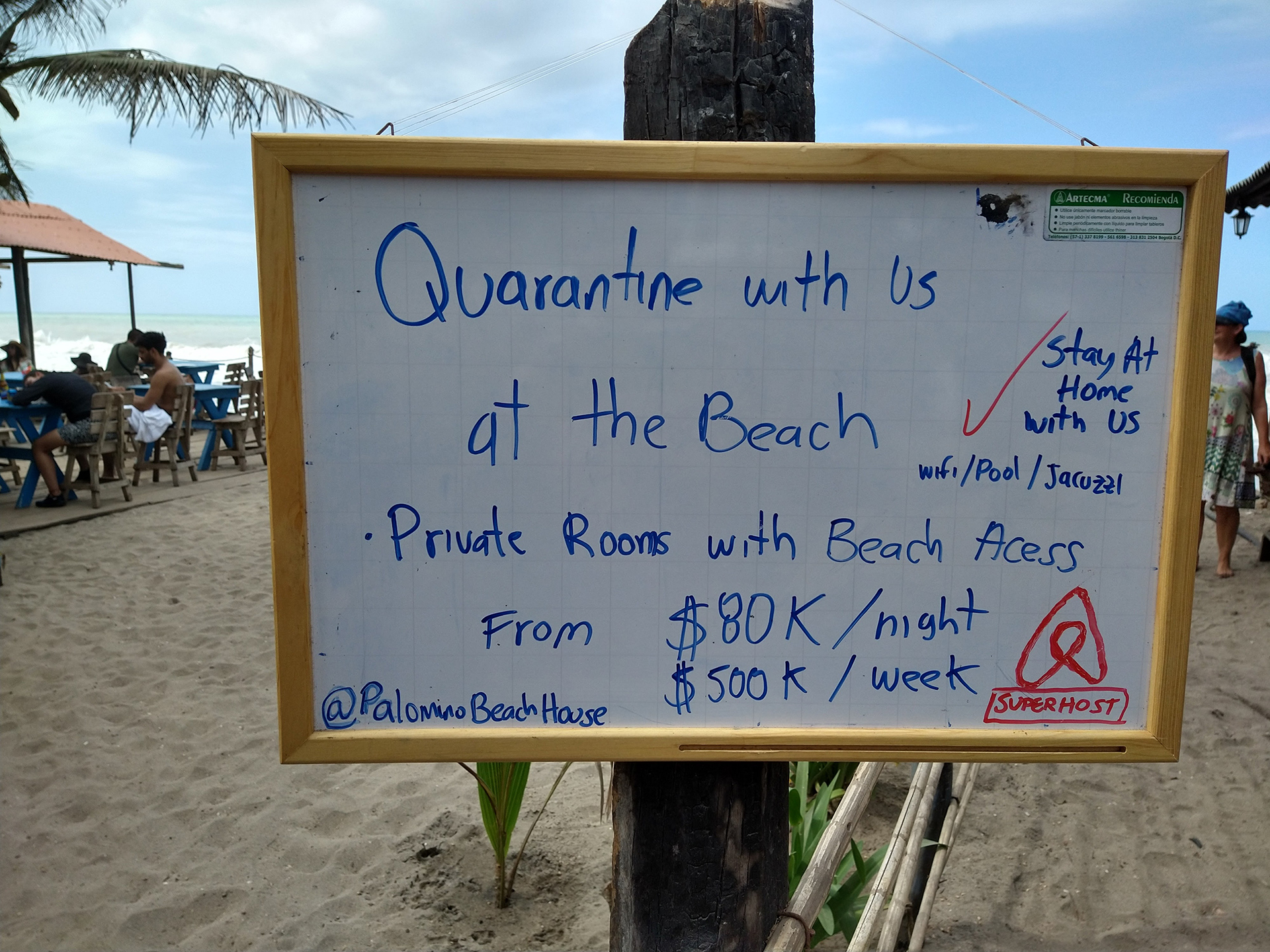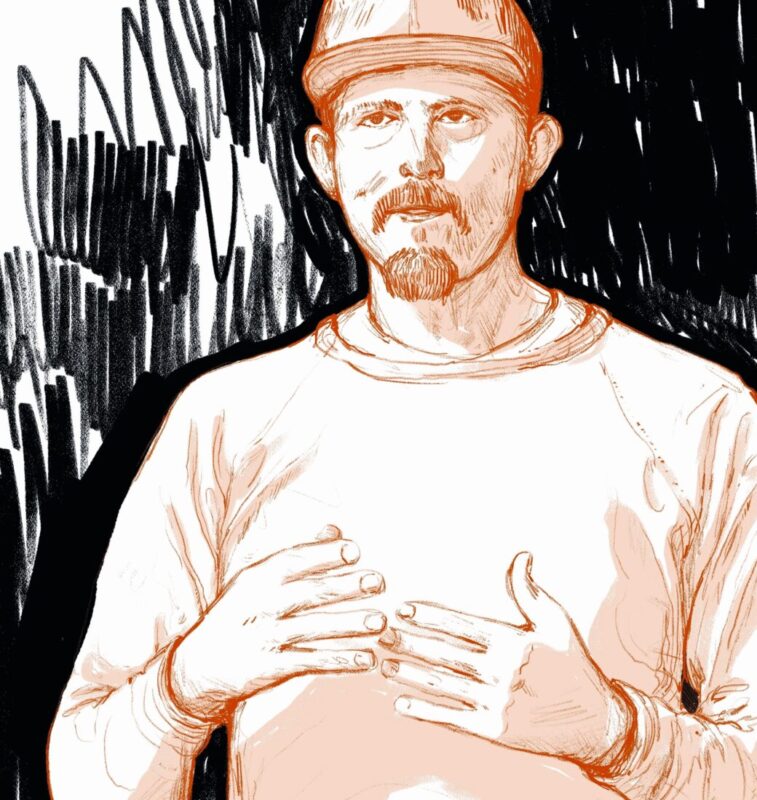"Back home, that was the best birthday present".
Newly retired, full of life and eager to travel. Colombia and then Valencia, that was the plan. But it turned out differently. A Corona-style return trip report. MK spoke with Ruedi Ulmann, former editor-in-chief of MK magazine, about queasy feelings, fierce loudspeaker announcements from moving motorcycles and about the best birthday present.

The Ulmann couple in the Corona hustle and bustle: "Before departure in Santa Marta. Practically everyone was wearing face masks. Without them, we would have felt practically naked.
MK: What were the travel plans originally?
Ruedi Ulmann: We had planned a two-month stay in Colombia and then a month in our apartment in the city center of Valencia. I didn't want to return to Switzerland until the beginning of May - after the flowering season of the shrubs and trees to whose pollen I am allergic.
To what extent did the Corona virus affect your return trip?
The return flight booked for March 28 via Madrid to Valencia was cancelled by Iberia on March 14. Because the situation in Spain deteriorated quickly, I had already tried to rebook the flight to Zurich via our travel agency Globetrotter. The cancellation intervened. The Globetrotter team made an incredible effort to find a solution as quickly as possible for customers willing to return. Already on Sunday, March 15, we had the offer for March 20, the following day we received the definite confirmation.
What goes through one's mind when faced with a pandemic so far from home?
A lot. As a journalist, I am interested in all relevant information. I see how many people are making a genuine effort to get to grips with the situation, not only for themselves but also as best they can within the scope of their duties. Others again act carefree or even try to make a name for themselves. There are many signs of solidarity, but unfortunately also the opposite. Humanity is learning. I am betting that this learning will help to make the world a better place.
Were there moments of solidarity among people?
Our hosts live from tourism. They helped where they could. The people we dealt with in the small tourist village were always very friendly and fair. I hope for them that they get through the difficult time well and that many more people can visit this beautiful Caribbean landscape.
You were traveling as an individual tourist. Did you feel left alone?
Colombia still has a bad reputation among many people. I would like to correct that. We were always treated very well as tourists. We always felt safe. However, we always informed ourselves on the spot about what was possible. We did not display any valuable items and - as always when traveling - we kept an eye on our belongings. Medellín is a super city with an innovative, very well-maintained, public transportation system and with car-free streets on weekends for pedestrian and bicycle traffic. The city is nestled in a gentle mountain landscape with the possibility for many beautiful excursions in the surrounding area.

Special offer for stranded tourists in Palomino in Colombia - necessity is the mother of invention.
Do you speak Spanish?
We can communicate well in Spanish, but were very often addressed in English. If you look around a little lost at a bus stop in Medellín, someone will offer you help very quickly.
How did they deal with the virus in Colombia, what was your experience?
In February and until about mid-March, it was hardly a topic - except in the foreign and business sections of the media. The first corona case was not detected until March 6 in Bogotá. About a week later, measures were announced very quickly, although the number of cases was still very low compared to Europe.
What did these measures look like?
At first, publicly accessible facilities such as museums, libraries, parks and tourist attractions were closed. On the weekend of March 14-15, the first curfews were imposed in major cities. On Wednesday, March 18, it was announced that air traffic would soon be suspended.
How did the country communicate that?
Among other things, via loudspeaker from a motorcycle that circulated in our resort Palomino. All foreigners should leave the country as soon as possible, was the short message in English and Spanish.
What were the reactions?
It increased the panic among tourists who had not yet found a way to return home. Many had already moved on to organize their return home in large cities with international airports such as Cartagena, Bogotá or Medellín.
Was there a moment when you realized, now I just want to go home?
There was the bad development in Spain. There, responsible politicians refused to look reality in the eye for a long time because of big events. For example, the spring festival "Fallas" in Valencia from March 1 to 19, which lasted several weeks, or Women's Day on March 8, which was held with huge manifestations in the major Spanish cities. The last six Fallas days with the most visitors were canceled only shortly before. Because we originally wanted to go to Valencia, I followed this development very closely in Spanish online media. The consequences for Spain are well known. With the cancellation of the return flight, it was then clear that we wanted to go home as soon as possible.

Empty, international terminal in Madrid on March 21 at 12:44. Otherwise, it has masses of people here at this time.
What was the return journey like?
On March 19, Iberia cancelled the onward flight from Madrid to Zurich. That pulled at the nerves. Globetrotter had to rebook again for us. The only available onward flight on March 21 - my birthday - was to Geneva. Because more passengers were stranded in transit in Madrid, Iberia organized a larger plane to Geneva at short notice. There were also people on board who actually wanted to go to Frankfurt.
Did you notice the tension caused by the plague?
At all airports, there were behavioral messages via posters, screens and regular announcements. In Bogotá, all arriving passengers had to disinfect their hands and their body temperature was measured.
And on arrival in Madrid?
There, the huge terminal was practically deserted. With the exception of a few stores offering food, everything was closed. In Madrid, a minimum distance of one meter was demanded.
And at Geneva Airport?
In Geneva, the passengers then learned before the entry control by the Swiss customs authority that a distance of two meters applies here. Posters in French and English informed about this. In addition, there were red lines in front of the entry control at intervals of two meters, in front of which only one person was allowed to stay at a time.
They then still had to take the train from Geneva to Zurich.
That was spooky.
What exactly do you mean by that?
Until Lausanne, there were two other passengers in the same car. After that, we were all alone on the road to Zurich. The stations that we saw were deserted, everything was as if deserted. The conductor, who passed by three times until Zurich, always turned his head away from us. We felt like lepers. We were not checked even once.
Were there moments when you and your wife felt queasy?
That was for me, when it was announced via loudspeaker that foreigners had to leave the country within three days.
Describe to us the feeling when you had Swiss soil under your feet again.
I was very happy. It was the best birthday present for me that I could imagine.








